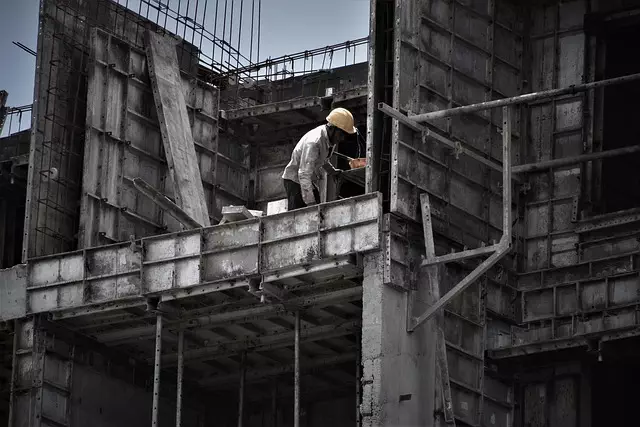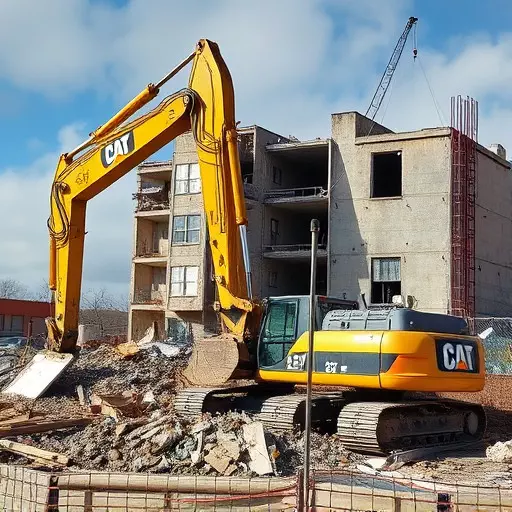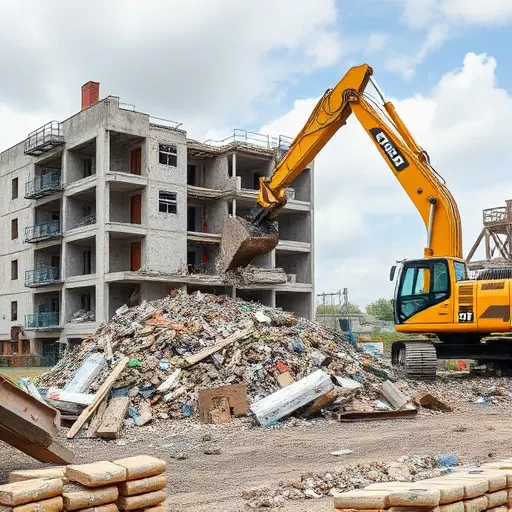Demolition permits in Toledo are essential for safe, regulated, and environmentally conscious construction and renovation projects, including building deconstruction which requires specific licenses. Obtaining these permits involves submitting detailed plans reviewed by city inspectors against zoning, codes, and safety standards. Professional demolition and recycling services in Toledo are revolutionizing the industry with efficient, sustainable solutions, specializing in both construction site demolition and building deconstruction to reduce environmental impact and promote a circular economy.
Demolition is an integral part of urban renewal, but it requires careful navigation through legal procedures. Understanding demolition permits is crucial for any construction project in Toledo, Ohio. This guide delves into the legal framework surrounding these permits, offering a comprehensive overview for both homeowners and contractors. We explore the step-by-step process of obtaining a permit, highlighting the benefits of professional demolition and recycling services in Toledo. Additionally, we compare traditional demolition with deconstruction, examining their environmental impacts.
- Understanding Demolition Permits: A Legal Overview
- The Process of Obtaining a Permit in Toledo
- Benefits of Professional Demolition and Recycling Services
- Deconstruction vs. Traditional Demolition: Environmental Impact Analysis
Understanding Demolition Permits: A Legal Overview
Demolition permits are a crucial aspect of construction and renovation projects, ensuring that all demolitions comply with local laws and regulations. In Toledo, for instance, individuals or businesses planning to undertake a construction site demolition or building deconstruction must first obtain the necessary permits from relevant authorities. These permits not only authorize the destruction but also dictate safety measures and environmental considerations during the process.
Understanding the legal framework behind these permits is essential for anyone involved in the demolition and recycling services Toledo market offers. Building deconstruction, as opposed to a straightforward knock-down, requires specific licenses due to its intricate nature and potential environmental impact. Permits ensure that materials are handled and disposed of responsibly, promoting sustainable practices in the construction industry. They also safeguard public safety by mandating controlled demolitions, minimizing risks associated with collapsing structures.
The Process of Obtaining a Permit in Toledo
Obtaining a demolition permit in Toledo is a straightforward process designed to ensure safety and compliance with local regulations. Property owners or contractors planning a construction site demolition or building deconstruction must first contact the Toledo Building Department to initiate the application procedure. This initial step involves submitting detailed plans outlining the proposed project, including the scope of work, expected timeline, and any environmental considerations.
The next phase includes the review of these plans by city inspectors who verify that the demolition aligns with zoning regulations, building codes, and safety standards. For projects involving extensive deconstruction or those requiring specialized services like demolition and recycling in Toledo, additional permits or approvals might be necessary. The Building Department will guide applicants through this process, ensuring a smooth transition from application to permit issuance, allowing for efficient project initiation.
Benefits of Professional Demolition and Recycling Services
Demolition and recycling services play a pivotal role in today’s construction industry, offering numerous benefits for both developers and the environment. Professional demolition companies in Toledo specialize in efficient and sustainable site clearance, ensuring that every aspect of the construction process is managed responsibly.
When it comes to construction site demolition or building deconstruction, these experts provide a range of advantages. They employ specialized techniques and equipment to expedite the process while minimizing environmental impact. Moreover, they are adept at separating valuable materials from debris, facilitating efficient recycling. This not only reduces the amount of waste ending up in landfills but also recovers reusable resources, such as metal, wood, and concrete, which can be repurposed in new construction projects.
Deconstruction vs. Traditional Demolition: Environmental Impact Analysis
In today’s world, where sustainability is at the forefront of many industries, a key consideration in construction projects is the environmental impact, especially when it comes to demolition. Traditional demolition methods often involve complete removal and disposal of materials, leading to significant waste and potential environmental harm. This is where deconstruction stands out as an eco-conscious alternative.
Deconstruction is a meticulous process that prioritises the careful disassembly and recycling of materials from a building. Rather than tearing down structures haphazardly, deconstruction specialists aim to salvage and reuse materials, such as wood, metal, and concrete, which can then be used in new construction projects or recycled into other products. This approach significantly reduces the environmental footprint associated with traditional demolition and encourages a circular economy by extending the lifespan of building materials. Services like demolition and recycling in Toledo are embracing this method to contribute to a more sustainable future, especially when dealing with construction site demolition and building deconstruction.


